AI in PPC management: 10 solutions for maximum performance
In the dynamic world of digital marketing, marketing agencies are constantly seeking innovative solutions to enhance their PPC campaigns. The advent of artificial intelligence (AI) in PPC management has brought forth promising possibilities for saving time, increasing efficiency, and boosting return on investment (ROI).
Establish yourself as the trusted local expert in digital advertising. Download "White label: Mastering Google and Facebook advertising for local businesses" right now.
However, it's essential to be mindful of the unique challenges that arise when using AI in this domain. In this article, we’ll explore key considerations for marketing agencies looking to leverage AI in PPC management and address potential roadblocks you may encounter along the way.
Things to keep in mind: challenges of using AI for PPC management
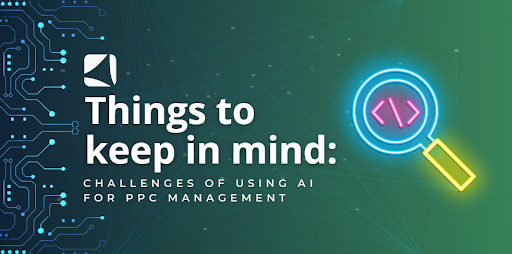
Lack of human intuition
While AI algorithms excel at analyzing data and patterns, they may fall short in areas that require human intuition and creativity. Crafting highly compelling ad copy and understanding nuanced audience preferences are tasks that often necessitate a more human touch, but can quickly lead to burnout if resources are limited.
By recognizing and harnessing the strengths of both AI and human advertisers, agencies can strike a balance that blends data-driven insights with the artistry of human-driven advertising. A common way for smaller agencies to get around a limited headcount is by leveraging white-label digital advertising services to take the brunt of the workload. That way, they can focus on packaging SEO and PPC management services for selling through a PPC reseller program.
Related topics: White-label PPC for agencies: The ultimate guide to ROI for your clients (Updated 2023)
Data quality and availability
The accuracy and effectiveness of AI PPC management rely heavily on the quality and availability of data. Dealing with limited or incomplete data sets can pose challenges in making accurate predictions and optimizations. Agencies must prioritize data quality assurance, employing methods such as data cleansing and integrating multiple data sources to enhance the reliability of the data that powers their AI-driven PPC campaigns.
Over-reliance on automation
Automation is a powerful tool that saves time and improves efficiency in PPC management. However, over-reliance on automation for decision-making can lead to missed opportunities and incorrect assumptions. Human marketers bring valuable insights, contextual knowledge, and the ability to adapt quickly to unforeseen circumstances, ensuring that strategic decision-making remains at the core of PPC campaigns. This is why you will need to strike a perfect balance between the two to achieve high-performing advertising efforts while delivering value through low-cost marketing techniques and strategies.
Limited transparency and control
AI algorithms can be complex and opaque, making it challenging to understand how specific decisions are reached. This lack of transparency can hinder troubleshooting efforts and slow the fine-tuning of campaign strategies. When you decide to incorporate AI into your PPC management strategy, seek AI platforms that provide advertising intelligence, transparency, and actionable insights to make decisions easier, identify areas of improvement, and optimize campaigns effectively.
Data privacy concerns
The integration of AI in PPC advertising raises valid concerns about data privacy and security. The vast amounts of user data required for effective AI-driven campaigns can become a target for misuse or even theft. To mitigate these risks, it is important to prioritize data privacy by partnering with reputable AI platforms that adhere to robust security protocols, implement privacy safeguards, and maintain strict compliance with data protection regulations. By adopting stringent measures, agencies can uphold the trust of their clients and prioritize the privacy and security of user data.
10 Benefits of using AI for PPC management
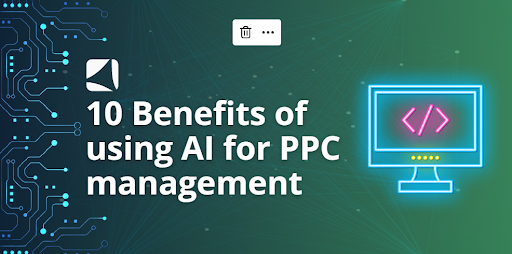
In recent years, companies have recognized the need to digitize their bidding processes. This transition has yielded significant advantages, including streamlined bidding processes, cost reduction, and improved efficiency. However, the integration of AI takes these benefits to an entirely new level. From automated bid management to real-time campaign optimization, discover how AI empowers marketing agencies to save time and maximize ROI.
1. Automated bid management
AI-powered PPC platforms leverage real-time data and performance indicators to optimize bidding strategies automatically. This not only saves time but also ensures that your ad spend is optimized for maximum returns.
To fully leverage the power of AI, it is key to consolidate and integrate various data sources into a unified system. This ensures that AI models are based on complete, accurate, and consistent data, enabling optimal decision-making and value creation.
The initial step in utilizing AI for bidding involves establishing your foundational roadmap. The roadmap serves as a guide for implementing AI throughout the bidding process. Key considerations include:
- Clearly understanding the problem the business is facing.
- Identifying use cases where AI can provide value.
- Evaluating the organization's readiness for AI adoption.
- Assessing the available data for supporting AI implementation.
- Determining the technical requirements for implementing AI.
- Evaluating potential risks and opportunities associated with AI adoption.
- Developing robust data management systems and processes to ensure data privacy, security, and regulatory compliance.
AI in bidding offers several use cases:
Research
AI can efficiently search and retrieve relevant information, including previous responses, expert knowledge, and insights about projects, individuals, or companies.
Planning
AI can extract requirements from Request for Tender documents, create outlines, generate compliance checklists, propose win themes, develop bid schedules aligned with tender timelines, and recommend team members and resources for specific bids.
Qualification and win probability
AI can assist in qualifying leads and assessing their relevance. It can also predict the win rate of opportunities in the pipeline, enabling early customer engagement and prioritization of activities.
Strategy and analysis
By utilizing AI-powered analytics, bidding professionals can uncover hidden patterns in large datasets, gaining insights into competitor strategies and the factors influencing win/loss outcomes.
Writing
It can automate tasks like idea generation, coherence, structure, paragraph-to-bullet-point conversion, word/character count reduction, and ensuring active voice usage.
2. Keyword research and optimization
AI tools possess the ability to analyze vast amounts of data, enabling them to identify relevant keywords and suggest opportunities for local SEO search engine marketing and advertising. This streamlines the keyword research process, allowing agencies to target the right keywords for improved campaign performance. In the example below, I asked ChatGPT to source some keywords related to the landing page of one of our most popular products, Social Marketing. It’s important to note that ChatGPT on its own can’t crawl web pages for information, so in this case, it's best to find targeted keywords based on a broader keyword.
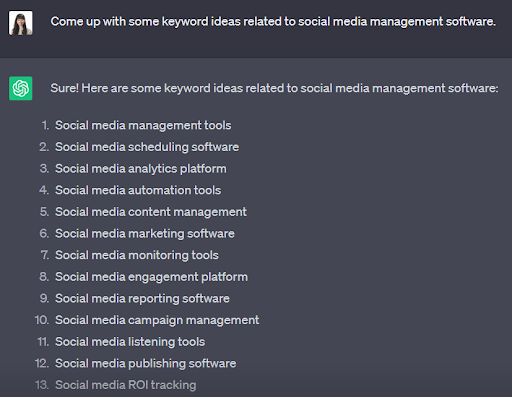
In this example, we only received 13 keywords, but what if we were trying to keep track of a much lengthier list?
Google gives a higher quality score for more relevant keywords. Hence, it is advisable to divide the keywords into smaller, more related clusters.
ChatGPT in itself is quite good at grouping words according to their relevance.
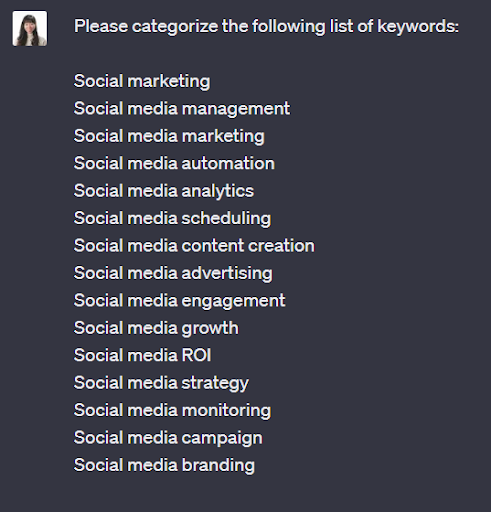
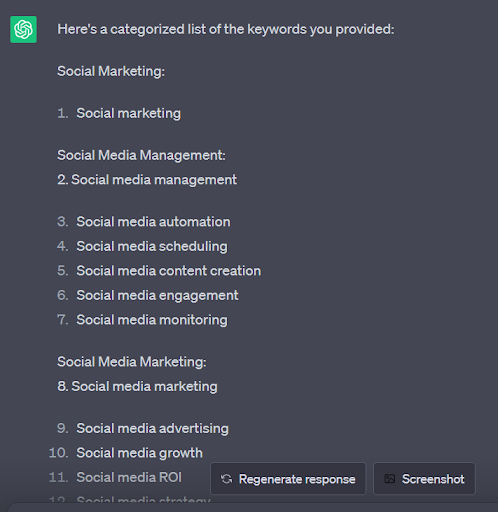
Alternatively, you can rank keywords by relevancy to optimize your content for the best search terms.

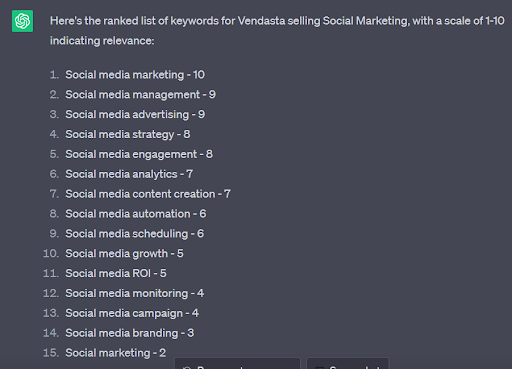
Also, see here: white label Google ads management
3. Ad copy generation
AI can generate ad copy variations based on predefined templates and data analysis to significantly reduce the time and effort spent on creating and testing ad messaging, enabling agencies to iterate quickly and find effective variations.
Traditionally, this would involve brainstorming ideas, crafting and testing multiple versions of the ad, and analyzing their performance. However, with AI-powered ad copy generation, the process can be simplified and accelerated.
From the example in the previous section, we decided to go a step further and asked ChatGPT to generate some ad headlines using the keywords it originally shared with us.
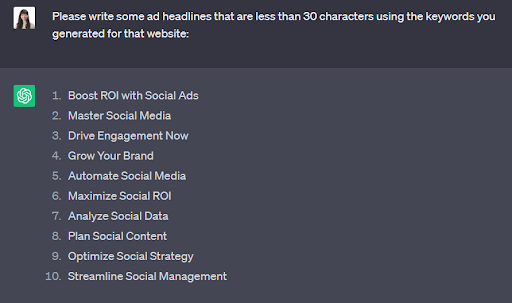
4. Performance tracking and reporting
AI-powered platforms can automatically track key performance metrics and generate comprehensive reports to assess campaign performance quickly and efficiently.
Traditionally, tracking performance metrics would involve manually collecting data from different advertising platforms, compiling it, and analyzing it to gain insights. This process can in many ways be time-consuming and prone to errors.
With AI-powered performance tracking and reporting, an agency can forgo several of these manual tasks. AI can seamlessly integrate with advertising platforms and automatically collect data on key performance metrics such as impressions, clicks, conversions, and cost-per-click.
Using this data, the AI platform will generate comprehensive reports that provide a clear overview of campaign performance. It can set up alerts or notifications for specific performance thresholds, ensuring immediate attention to any anomalies or areas of concern.
5. Predictive analytics
AI algorithms analyze historical data and patterns to make accurate predictions about future campaign performance. Armed with these insights, agencies can make informed decisions on budget allocation, bid adjustments, and targeting strategies. The result? Better results and cost savings.
Let’s imagine a marketing agency assisting a flower shop in promoting its new product line—organic succulent fertilizer. By analyzing historical data, the agency gains insights into effective campaign strategies, such as identifying channels with higher conversion rates and optimizing targeting to engage the most relevant audience. This data-driven approach ensures an efficient allocation of the budget, increased ROI, and proactive identification of risks and opportunities for the flower shop's PPC campaign.
6. Audience targeting and segmentation
AI tools delve deep into user behavior and preferences, enabling agencies to identify the most relevant audience segments. By creating highly targeted campaigns, agencies can reduce ad spend wastage and improve conversion.
For example, let's consider a marketing agency working with an e-commerce client that sells athletic apparel. Traditionally, identifying the right audience segments for their campaigns would involve manual analysis of demographic data, market research, and trial-and-error testing.
With AI-powered audience targeting and segmentation, the agency can analyze vast amounts of user data, including browsing behavior, purchase history, social media interactions, and other relevant data points to get meaningful insights.
Based on this analysis, the AI can uncover the right segment of users who have shown a high propensity for purchasing athletic apparel, have engaged with similar brands, or exhibit specific behavior indicating an interest in fitness and active lifestyles.
So, how could we put this into practice? Below, we asked ChatGPT to help us identify some attributes that would attract our target audience.

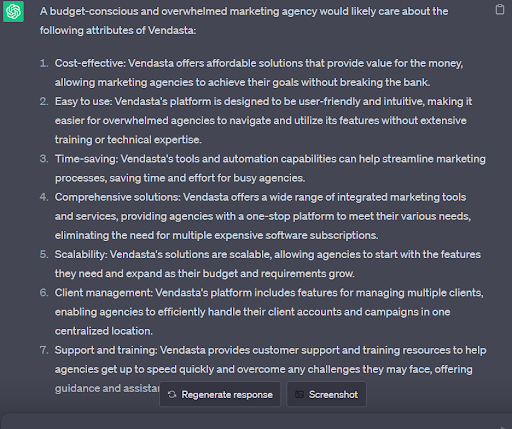
From there, we can ask the AI to organize its findings into a table and convert these identified attributes into actionable keywords.
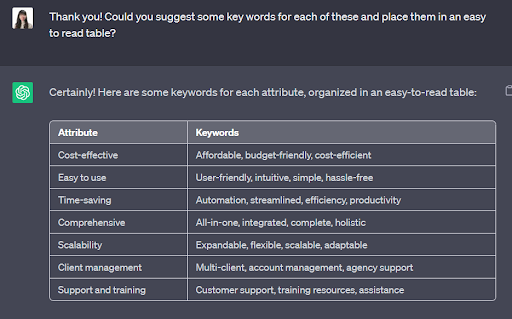
We can go even further than this and adjust our selected keywords into ones our target audience might search for.
![]()
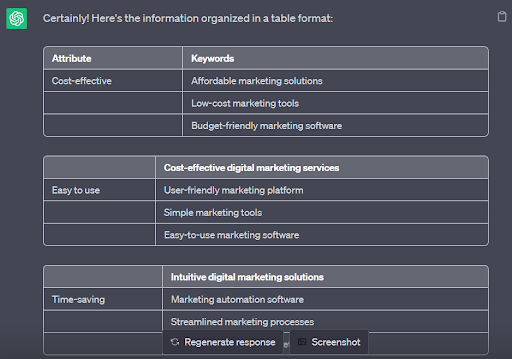
7. Fraud detection
AI-powered fraud detection is a game-changer for marketing agencies looking to safeguard their ad budgets and maximize their return on investment.
Consider a marketing agency running a pay-per-click (PPC) campaign for a client in the e-commerce industry. Their goal is to drive traffic to the client's website and generate conversions. However, fraudulent clicks quickly exhaust the ad budget without delivering any real value.
With AI-powered fraud detection, the agency can proactively identify and prevent fraudulent clicks from draining their ad spend. The AI algorithms analyze various data points, such as click patterns, IP addresses, device information, and user behavior, to distinguish between genuine clicks and fraudulent activity.
By swiftly identifying and filtering out fraudulent clicks, the agency can ensure that their ad budget is allocated to legitimate and high-quality clicks that have the potential to convert, while also building trust by demonstrating a commitment to protecting their client’s ad budget.
8. Ad testing and optimization
AI algorithms excel at testing and analyzing performance data. By identifying the most effective ad variations, your marketing agency can better optimize your clients’ campaigns in a fraction of the time.
Let’s take a look at an example. Consider a scenario where an eCommerce fashion brand is partnering with a marketing agency to boost its online sales through PPC advertising. Using AI-powered ad testing and optimization, the agency can quickly conduct a comprehensive analysis of the brand's PPC ads. They create multiple variations of ad copy, headlines, visuals, and calls to action.
The AI platform deploys the ad variations across various PPC channels, such as search engines and social media platforms, targeting specific demographics, interests, and browsing behaviors.
The AI algorithms then analyze the performance data to identify the most effective ad variations. For instance, they might discover that ad variations featuring vibrant lifestyle imagery and limited-time offers perform exceptionally well among young fashion enthusiasts.
Armed with these insights, the agency can optimize the campaigns by reallocating the budget toward the top-performing ad variations. They might increase the bids for these ads, extend their reach to new audiences, and refine the messaging based on the AI's recommendation to prevent wasteful spending on underperforming campaigns.
As the campaigns progress, the AI algorithm can continue to monitor and evaluate the performance of the ad variations. For example, if the AI detects a surge in interest in sustainable fashion, the agency can quickly introduce ad variations highlighting the brand's eco-friendly initiatives.
At the end of the day, the AI PPC management strategy the agency initiated enabled them to adapt quickly to help their client garner a competitive edge.
Also see here: 10 step digital marketing strategy
9. Ad scheduling and budget optimization
AI-driven analysis ensures that your ads are shown when they are most likely to generate conversions.
Let’s take for example a travel agency who wants to enhance the effectiveness of their pay-per-click (PPC) advertising campaigns to drive more bookings for their vacation packages. They collaborate with a marketing agency that utilizes AI-driven ad scheduling and budget optimization to maximize the impact of their ads.
Through AI, they discover that Monday evenings and weekends tend to generate the most bookings among luxury travelers. With this knowledge, the AI-powered platform determines the optimal ad scheduling strategy. It automatically adjusts the campaign settings to ensure that ads are displayed prominently during these high-conversion periods.
In this specific use case, AI-powered ad scheduling and budget optimization empowered the marketing agency to react more quickly to trending behaviors and save time and resources by automating steps in the scheduling process.
Related topic: MSP Vendasta White-Label PPC: How MSPs can open a new revenue stream
10. Creating smarter landing pages
As more and more campaigns become automated by ad engines, sometimes ads will show up for seemingly irrelevant search terms. At first, this might seem puzzling, but what could be happening is that the content on your landing page might be skewing too broadly.
Dynamic search ads (DSAs) for example, utilize the copy on the webpage to determine relevant search terms that should trigger an ad.
So we decided to consult ChatGPT to get its insights on what it thinks our landing page is about.

This response was fairly broad and made us think about how to optimize this page with text that more aligns with our core business. Instead of doing this manually, however, we let Chat GPT help us out.
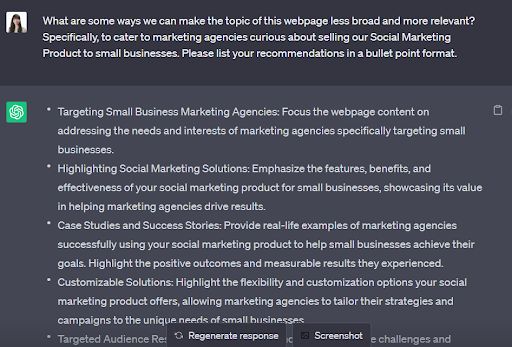
From here, we asked ChatGPT to take its recommendations and condense it down to a list of keywords we can incorporate onto our webpage.
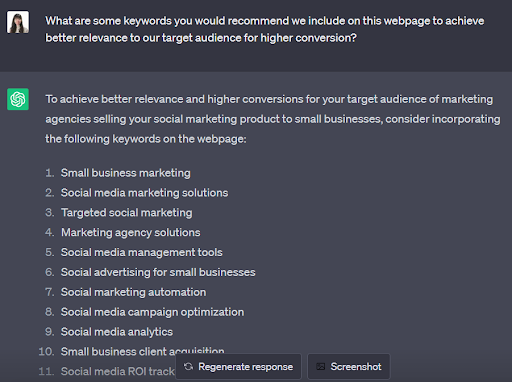
With this information, we can make adjustments to our landing page or make an informed decision about whether to exclude a specific page from automated campaigns entirely.
Frequently asked questions
How accurate is AI in predicting PPC performance?
AI algorithms have demonstrated high accuracy in predicting PPC performance by analyzing historical data, patterns, and performance indicators. However, the accuracy of predictions depends on factors such as data quality, model training, campaign complexity, and continuous learning. While AI predictions provide valuable insights, they are not infallible, and human expertise should complement them for optimal results. By combining AI technology with human insights, marketing agencies can make informed decisions and optimize their PPC campaigns.
Can AI improve the targeting and relevance of my PPC ads?
Yes, AI can significantly improve the targeting and relevance of PPC ads. AI tools can analyze vast amounts of data related to user behavior, preferences, demographics, and online activities. This allows AI to identify the most relevant audience segments for your ads and target them more effectively. AI can also help optimize keyword targeting by suggesting relevant keywords and identifying optimization opportunities. By fine-tuning audience targeting and keyword selection, AI helps reduce ad spend wastage and improve the overall relevance of your PPC ads.
[adrotate banner="184"]

